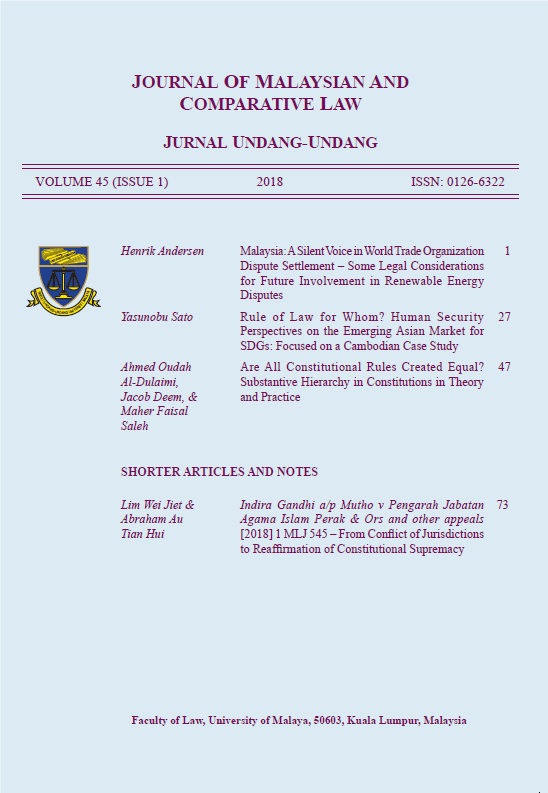Editorial Note
Keywords:
editor, editorialAbstract
Editorial Note
This volume of the Journal of Malaysian and Comparative law is significant in that it is the volume released in a ‘new Malaysia’ consequent upon the 14th General Elections on 9 May which saw the defeat of the 60 year old Barisan Nasional government, and the dawn of a new ‘coalition of hope’. Coincidentally the articles in this volume seem to reflect that new dawn, especially where Malaysian jurisprudence is concerned. A major Federal Court decision seeks to redress the uncertainties surrounding the role of the civil courts, and consequently civil law vis-a-vis the Syariah court which administers Islamic law. In so doing, the Federal Court has clothed the Malaysian Federal Constitution with a basic structure which cannot be abrogated or removed. These include the principles of the separation of powers, the rule of law and the protection of minorities. The significance of this decision is ably addressed by Lim Wei Jiet and Abraham Au Tian Hui in their piece on the reaffirmation of Constitutional supremacy consequent upon the Federal Court decision in Indira Gandhi a/p Mutho v Pengarah Jabatan Agama Islam Perak & Ors.
Still on the subject of the Constitution, Al-Dulaimi, Deem and Saleh argues on the existence of substantive hierarchies within constitutions which must be textually and judicially recognised. They referred to the Malaysian court's decision in Indira Gandhi as an example of how the basic structure doctrine has been given a higher position inside the Malaysian constitutional system. In the article, "Malaysia : A silent voice in World Trade Organization dispute settlement - some legal considerations for future involvement in renewable energy disputes", Henrik Anderson argues that Malaysia should play a more active role in WTO dispute settlement, especially in disputes concerning renewable energy as such cases might affect the export interests of Malaysia. Malaysia is one of the world's leading exporter of solar panels.
Yasunobu Sato's piece on "Rule of law for whom?" is a significant study of the negative impacts of external international agencies and their reform initiatives in Asia, with particular focus on Cambodia. Among others, he argues that the rule of law projects advanced by donors must understand local context as well as respect and encourage local ownership. To this end, local law, especially customary law and practice as well as traditional dispute processing should be respected and reformed as well.
Dr. Sharifah Suhanah Syed Ahmad
Executive Editor



